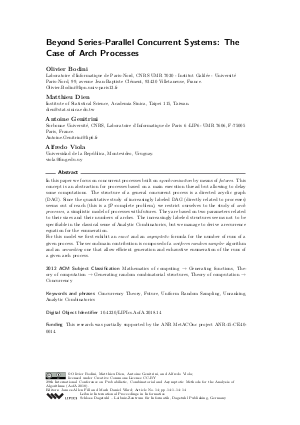Beyond Series-Parallel Concurrent Systems: The Case of Arch Processes
Authors Olivier Bodini, Matthieu Dien, Antoine Genitrini, Alfredo Viola
-
Part of:
Volume:
29th International Conference on Probabilistic, Combinatorial and Asymptotic Methods for the Analysis of Algorithms (AofA 2018)
Part of: Series: Leibniz International Proceedings in Informatics (LIPIcs)
Part of: Conference: International Conference on Probabilistic, Combinatorial and Asymptotic Methods for the Analysis of Algorithms (AofA) - License:
 Creative Commons Attribution 3.0 Unported license
Creative Commons Attribution 3.0 Unported license
- Publication Date: 2018-06-18
File

PDF
LIPIcs.AofA.2018.14.pdf
- Filesize: 0.51 MB
- 14 pages
Document Identifiers
Subject Classification
ACM Subject Classification
- Mathematics of computing → Generating functions
- Theory of computation → Generating random combinatorial structures
- Theory of computation → Concurrency
Keywords
- Concurrency Theory
- Future
- Uniform Random Sampling
- Unranking
- Analytic Combinatorics
Metrics
- Access Statistics
-
Total Accesses (updated on a weekly basis)
0Document
0Metadata
Abstract
In this paper we focus on concurrent processes built on synchronization by means of futures. This concept is an abstraction for processes based on a main execution thread but allowing to delay some computations. The structure of a general concurrent process is a directed acyclic graph (DAG). Since the quantitative study of increasingly labeled DAG (directly related to processes) seems out of reach (this is a #P-complete problem), we restrict ourselves to the study of arch processes, a simplistic model of processes with futures. They are based on two parameters related to their sizes and their numbers of arches. The increasingly labeled structures seems not to be specifiable in the classical sense of Analytic Combinatorics, but we manage to derive a recurrence equation for the enumeration. For this model we first exhibit an exact and an asymptotic formula for the number of runs of a given process. The second main contribution is composed of a uniform random sampler algorithm and an unranking one that allow efficient generation and exhaustive enumeration of the runs of a given arch process.
Cite As Get BibTex
Olivier Bodini, Matthieu Dien, Antoine Genitrini, and Alfredo Viola. Beyond Series-Parallel Concurrent Systems: The Case of Arch Processes. In 29th International Conference on Probabilistic, Combinatorial and Asymptotic Methods for the Analysis of Algorithms (AofA 2018). Leibniz International Proceedings in Informatics (LIPIcs), Volume 110, pp. 14:1-14:14, Schloss Dagstuhl – Leibniz-Zentrum für Informatik (2018)
https://doi.org/10.4230/LIPIcs.AofA.2018.14
BibTex
@InProceedings{bodini_et_al:LIPIcs.AofA.2018.14,
author = {Bodini, Olivier and Dien, Matthieu and Genitrini, Antoine and Viola, Alfredo},
title = {{Beyond Series-Parallel Concurrent Systems: The Case of Arch Processes}},
booktitle = {29th International Conference on Probabilistic, Combinatorial and Asymptotic Methods for the Analysis of Algorithms (AofA 2018)},
pages = {14:1--14:14},
series = {Leibniz International Proceedings in Informatics (LIPIcs)},
ISBN = {978-3-95977-078-1},
ISSN = {1868-8969},
year = {2018},
volume = {110},
editor = {Fill, James Allen and Ward, Mark Daniel},
publisher = {Schloss Dagstuhl -- Leibniz-Zentrum f{\"u}r Informatik},
address = {Dagstuhl, Germany},
URL = {https://drops.dagstuhl.de/entities/document/10.4230/LIPIcs.AofA.2018.14},
URN = {urn:nbn:de:0030-drops-89075},
doi = {10.4230/LIPIcs.AofA.2018.14},
annote = {Keywords: Concurrency Theory, Future, Uniform Random Sampling, Unranking, Analytic Combinatorics}
}
Author Details
- Laboratoire d'Informatique de Paris-Nord, CNRS UMR 7030 - Institut Galilée - Université Paris-Nord, 99, avenue Jean-Baptiste Clément, 93430 Villetaneuse, France.
- Sorbonne Université, CNRS, Laboratoire d'Informatique de Paris 6 -LIP6- UMR 7606, F-75005 Paris, France.
Funding
This research was partially supported by the ANR MetACOnc project ANR-15-CE40-0014.
References
- The ecmascript 2015 language specification, 2015. URL: http://www.ecma-international.org/ecma-262/6.0/index.html.
-
M. Abramowitz and I. A. Stegun. Handbook of Mathematical Functions with Formulas, Graphs, and Mathematical Tables. Dover, New York, ninth dover printing, tenth gpo printing edition, 1964.

-
C. Baier and J.-P. Katoen. Principles of Model Checking (Representation and Mind Series). The MIT Press, 2008.

-
H. C. Baker, Jr. and C. Hewitt. The incremental garbage collection of processes. In Proceedings of the 1977 Symposium on Artificial Intelligence and Programming Languages, pages 55-59. ACM, 1977.

-
O. Bodini, M. Dien, X. Fontaine, A. Genitrini, and H.-K. Hwang. Increasing diamonds. In Latin American Symposium on Theoretical Informatics, pages 207-219. Springer, Berlin, Heidelberg, 2016.

-
O. Bodini, M. Dien, A. Genitrini, and F. Peschanski. Entropic uniform sampling of linear extensions in series-parallel posets. In 12th International Computer Science Symposium in Russia (CSR), pages 71-84, 2017.

-
O. Bodini, M. Dien, A. Genitrini, and F. Peschanski. The Ordered and Colored Products in Analytic Combinatorics: Application to the Quantitative Study of Synchronizations in Concurrent Processes. In 14th SIAM Meeting on Analytic Algorithmics and Combinatorics (ANALCO), pages 16-30, 2017.

-
O. Bodini, A. Genitrini, and F. Peschanski. The combinatorics of non-determinism. In FSTTCS'13, volume 24 of LIPIcs, pages 425-436. Schloss Dagstuhl, 2013.

-
O. Bodini, A. Genitrini, and F. Peschanski. A Quantitative Study of Pure Parallel Processes. Electronic Journal of Combinatorics, 23(1):P1.11, 39 pages, (electronic), 2016.

-
G. Brightwell and P. Winkler. Counting linear extensions is ♯P-Complete. In STOC, pages 175-181, 1991.

- P. Flajolet and R. Sedgewick. Analytic Combinatorics. Cambridge University Press, 2009. URL: http://www.cambridge.org/uk/catalogue/catalogue.asp?isbn=9780521898065.
-
P. Flajolet, P. Zimmermann, and B. Van Cutsem. A calculus for the random generation of labelled combinatorial structures. Theoretical Computer Science, 132(1-2):1-35, 1994.

-
R. Grosu and S. A. Smolka. Monte carlo model checking. In TACAS'05, volume 3440 of LNCS, pages 271-286. Springer, 2005.

-
A. Khoroshkin and D. Piontkovski. On generating series of finitely presented operads. Journal of Algebra, 426:377-429, 2015.

-
D. E. Knuth. The art of computer programming, volume 3: (2nd ed.) sorting and searching. Addison Wesley Longman Publishing Co., Inc., Redwood City, CA, USA, 1998.

-
L. Lipshitz. The diagonal of a d-finite power series is d-finite. Journal of Algebra, 113(2):373-378, 1988.

-
C. Martínez and X. Molinero. Generic algorithms for the generation of combinatorial objects. In MFCS'03, pages 572-581. Springer Berlin Heidelberg, 2003.

-
R. Milner. A Calculus of Communicating Systems. Springer Verlag, 1980.

-
R.W.D. Nickalls. Viète, descartes and the cubic equation. The Mathematical Gazette, 90(518):203–208, 2006.

-
A. Nijenhuis and H.S. Wilf. Combinatorial algorithms. Computer science and applied mathematics. Academic Press, New York, NY, 1975.

-
R.P. Stanley. Enumerative Combinatorics:. Cambridge Studies in Advanced Mathematics. Cambridge University Press, 2001.

